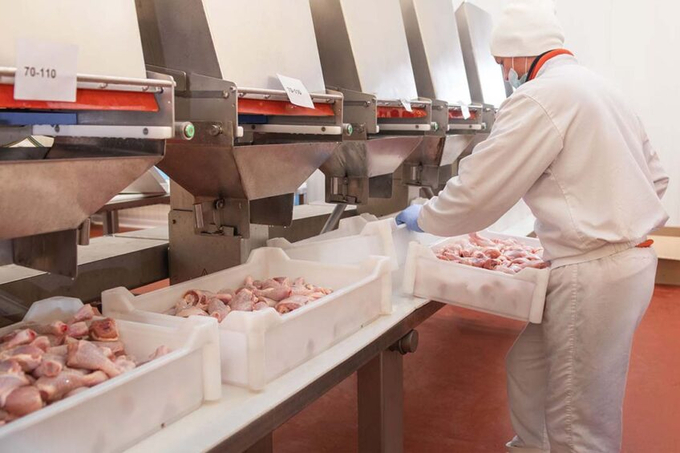June 2, 2025 | 06:50 GMT +7
June 2, 2025 | 06:50 GMT +7
Hotline: 0913.378.918
June 2, 2025 | 06:50 GMT +7
Hotline: 0913.378.918

It is reported that in 2024, Russia plans to produce 2% more poultry meat than in 2023. Photo: Canva
Recently, the average wholesale price of broiler meat on the Russian market decreased by 0.1% to 157 roubles (US$1.73) per kg. The average wholesale price of a pack of 10 eggs dropped by 1.3% to 89.7 roubles (US$0.99), the Russian Agricultural Ministry said in a statement. The price dynamics have remained predominately flat since January 2024, following unprecedented turbulence in the second half of 2023.
The occasional shortage of broiler meat on the shelves, seen in some regions in September 2023 and January 2024, is no longer occuring.
New trade agreements between manufacturers and wholesale customers, concluded with support from the Russian authorities, have largely helped to calm market dynamics, Maxim Shaskosky, head of the Russian Federal Antimonopoly Service, said during a recent meeting with Russian Prime Minister Alexey Mishustin.
At the end of 2023, the Russian government adopted a decree allowing Russian regional authorities to take steps to lower poultry and egg prices. At the time of the meeting, Shaskosky said 34 regions utilised this tool, signing agreements with 2,200 food manufacturers, under which they promised to constrain the rise in wholesale prices in exchange for certain benefits.
In addition, FAS has “worked with the largest suppliers” in the poultry market, which also contributed to the drop in prices. The authorities’ investigation revealed that in particular cases, the upward price dynamics were not justified by a corresponding growth in production costs or change in business marginality.
In total, FAS kicked off 10 cases against Russian poultry and egg manufacturers for breaking antimonopoly law, Shaskosky disclosed, not providing further details.
Thanks to generous state aid, Russia is on track to expand egg and poultry production in 2024, Maxim Uvaidov, deputy head of the Russian Agricultural Ministry, said during a recent parliament session.
He said 51 egg farms are due to expand egg production in total, thanks to bank loans with subsidised interest rates. In 2023, Russian egg production reached 46.6 billion units, adding 1.2% to the 2022 level, Uvaidov said.
Similar work is being done in the poultry meat segment to encourage farmers to scale up operations. The plan for 2024 is to produce 2% more poultry meat than in 2023, Uvaidov added. In 2023, Russian farmers manufactured 5.156 million tonnes of poultry in slaughter weight, 0.3% more than the previous year.
(PW)

(VAN) Vikas Rambal has quietly built a $5 billion business empire in manufacturing, property and solar, and catapulted onto the Rich List.

(VAN) Available cropland now at less than five percent, according to latest geospatial assessment from FAO and UNOSAT.

(VAN) Alt Carbon has raised $12 million in a seed round as it plans to scale its carbon dioxide removal work in the South Asian nation.

(VAN) Attempts to bring down the price of the Japanese staple have had little effect amid a cost-of-living crisis.

(VAN) Fourth most important food crop in peril as Latin America and Caribbean suffer from slow-onset climate disaster.

(VAN) Shifting market dynamics and the noise around new legislation has propelled Trouw Nutrition’s research around early life nutrition in poultry. Today, it continues to be a key area of research.

(VAN) India is concerned about its food security and the livelihoods of its farmers if more US food imports are allowed.